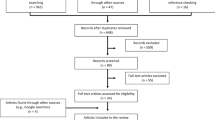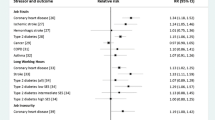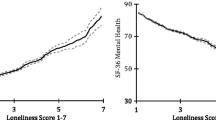Abstract
Objectives: The objective of this study was to assess whether recurrent involuntary job loss among US workers nearing retirement resulted in increasingly less severe changes in depressive symptoms with successive job losses. Methods: With data drawn from the US Health and Retirement Survey (HRS), we used repeated measures longitudinal analysis to investigate the effect of recurrent job loss on follow-up depressive symptoms, measured up to 2 years following job loss. Study participants include 617 individuals, aged 51–61 years at the 1992 study baseline, who had at least one job loss between 1990 and 2000. Our primary outcome variable was a continuous measure of depressive symptoms, constructed from the 8-item Center for Epidemiologic Studies-Depression (CES-D) battery administered at every HRS wave. A second, dichotomous outcome, derived from the continuous measure, measured clinically relevant depressive symptoms. The exposure (recurrent job loss) was defined by binary dummy variables representing two and three/four job losses. All job losses were the result of either plant closing or layoff. Results: Our main finding indicates that, after relevant covariates are controlled, compared to one job loss, two job losses result in a modest increase in the level depressive symptoms (not significant) at two-year follow-up. Three or more job losses result, on average, in a decline in depressive symptoms to a level near pre-displacement assessment (not significant). Somewhat in contrast, two job losses were found to be associated with increased risk of clinically relevant depressive symptoms. Conclusions: The principal finding confirms our hypothesis that, among US workers nearing retirement, repeated exposure to job separation results in diminished effects on mental health. Adaptation to the job loss stressor may underlie the observed response, although other explanations, including macroeconomic developments, are possible.
Similar content being viewed by others
References
Beckett JO (1988) Plant closings: How older workers are affected. Soc Work 33:29–33
Brenner SO, Starrin B (1988) Unemployment and health in Sweden: public issues and private troubles. J Soc Issues 44:125–140
Carver CS (1998) Resilience and thriving: issues, models, and linkages. J Soc Issues 54:245–266
Claussen B (1999) Health and re-employment in a five-year follow-up of long-term unemployed. Scand J Public Health 27:94–100
Comstock GW, Helsing K (1976) Symptoms of depression in two communities. Psychol Med 6:551–563
Couch KA (1998) Late life job displacement. Gerontologist 38:7–17
Dooley D, Catalano R (1999) Unemployment, disguised unemployment, and health: the US case. Int Arch Occup Environ Health 72(Suppl):s16–s19
Dooley D, Prause J (2004) Settling down: psychological depression and underemployment. In: Dooley D, Prause J (eds) The social costs of underemployment. Cambridge University Press, Cambridge pp 134–157
Dwyer CA (1996) Cut scores and testing: statistics, judgment, truth, and error. Psychol Assessment 8:360–362
Farber HS (2003) Jobs Loss in the United States, 1981–2001. NBER working paper series. National Bureau of Economic Research, Cambridge, MA, pp 1–41
Frese M, Mohr G (1987) Prolonged unemployment and depression in older workers: a longitudinal study of intervening variables. Soc Sci Med 25:173–178
Fryer D (1999) For better or for worse? Interventions and mental health consequences of unemployment. Int Arch Occup Environ Health 72(Suppl):s34–s37
Gallo JJ, Royall DR, Anthony JC (1993) Risk factors for the onset of depression in middle age and later life. Soc Psychiatry Psychiatr Epidemiol 28:101–108
Gallo WT, Bradley EH, Siegel M, Kasl SV (2000) Health effects of involuntary job loss among older workers: findings from the health and retirement survey. J Gerontol 55:s131–s140
Grossi G (1999) Coping and emotional distress in a sample of Swedish unemployed. Scand J Psychol 40:157–165
Grzywacz JG, Dooley D (2003) “Good jobs” to “bad jobs”: replicated evidence of an employment continuum from two large surveys. Soc Sci Med 56:1749–1760
Hallsten LG, Grossi G, Westerlund H (1999) Unemployment, labour market policy and health in Sweden during years of crisis in the 1990’s. Int Arch Occup Environ Health 72(Suppl):s28–s30
Hipple S (1999) Worker displacement in the mid-1990s. Mon Labor Rev 122:15–32
ICOH Working Group (1999) Unemployment and health. Int Arch Occup Environ Health 72(Suppl):s1–s48
Iversen L, Klausen H (1986) Alcohol consumption among laid-off workers before and after closure of a Danish ship-yard: a 2-year follow-up study. Soc Sci Med 22:107–109
Jahoda M (1981) Work, employment, and unemployment. Am Psychol 36:184–191
Joelson L, Wahlquist L (1987) The psychological meaning of job insecurity and job loss: results of a longitudinal study. Soc Sci Med 25:179–182
Jones RN (2001) Course of depression among middle-aged and older adults. Gerontologist 41(Suppl S1):s72
Jones RN, Fonda SJ (2004) Use of an IRT-based latent variable model to link different forms of the CES-D from the Health and Retirement Study. Soc Psychiatry Psychiatr Epidemiol 39:828–835
Juster FT, Suzman R (1995) An overview of the Health and Retirement Study. J Hum Resour 30(suppl):s7–s56
Kanfer R, Wanberg CR, Kantrowitz TM (2001) Job search and employment: a personality-motivational analysis and meta-analytic review. J Appl Psychol 86:837–855
Kaplan GA, Roberts RE, Camacho TC, Coyne JC (1987) Psychosocial predictors of depression. prospective evidence from the human population laboratory studies.” Am J Epidemiol 125:206–220
Kasl SV, Jones BA (2000) The impact of job loss and retirement on health. In: Berkman LF, Kawachi LV (eds) Social epidemiology. Oxford University Press, Oxford pp 118–136
Kessler RC, Turner JB, House JS (1988) Effects of unemployment on health in a community survey: main, modifying, and mediating effects. J Soc Issues 44:69–85
Kessler RC, Turner JB, House JS (1989) Unemployment, reemployment, and emotional functioning in a community sample. Am Sociol Rev 54:648–657
Lazarus RS, Folkman S (1984) Stress, appraisal, and coping. Springer, Berlin Heidelberg New York
Leana CR, Feldman DC (1995) Finding new jobs after a plant closing: antecedents and outcomes of the occurrence and quality of reemployment. Hum Relat 12:1381–1401
Link BG, Dohrenwend BP (1989) The epidemiology of mental disorders. In: Freeman HE, Levine S (eds) Handbook of medical sociology. 4th edn. Prentice Hall, Englewood Cliffs, NJ pp 102–127
Matoba T, Ishitake T, Noguchi R (2003) A 2-year follow-up survey of health and life style in Japanese unemployed persons. Int Arch Occup Environ Health 76:302–308
McKee-Ryan F, Song Z, Wanberg CR, Kinicki AJ (2005) Psychological and physical well-being during unemployment: a meta-analytic study. J Appl Psychol 90:53–76
Novo MV (1999) Unemployment and mental health in Galicia, Spain. Int Arch Occup Environ Health 72(Suppl):s14–s15
Penninx BW, Guralnick JM, Ferrucci L, Simonsick EM, Deeg DJ, Wallace RB (1998) Depressive symptoms and physical decline in community-dwelling older persons. JAMA 279:1720–1726
Price RH, Choi JN, Vinokur AD (2002) Links in the chain of adversity following job loss: how financial strain and loss of personal control lead to depression, impaired functioning, and poor health. J Occup Health Psychol 7:302–312
Proudfoot J, Gray F, Carson J, Guest D, Dunn G (1999) Psychological training improves mental health and job-finding among unemployed people. Int Arch Occup Environ Health 72(Suppl):s40–s42
Radloff L (1977) The CES-D Scale: a self-report depression scale for research in the general population. Appl Psych Meas 1:385–401
Steffick D (2000) Documentations of affective functioning measures in the Health and Retirement Study. HRS/AHEAD Documentation Report DR-005. Survey Research Center, University of Michigan, Ann Arbor, MI (available at http://www.umich.edu/∼hrswww/docs/userg/index.html)
Tugade MM, Fredrickson BL, Barrett LF (2004) Psychological resilience and positive emotional granularity: examining the benefits of positive emotions on coping and health. J Pers 72:1161–1190
Ware JH (1985) Linear models for the analysis of several measurements in longitudinal studies. Am Stat 39:95–101
Warr PB, Jackson PR (1985) Factors influencing the psychological impact of prolonged unemployment and of re-employment. Psychol Med 15:795–807
Warr PB, Jackson PR, Banks M (1988) Unemployment and mental health: some British studies. J Soc Issues 44:47–68
Wolfinger R, O’Connell SS (1993) Generalized linear models: A pseudo-likelihood approach. J Stat Comput Sim 48:233–243
Zeger SL, Liang KY (1986) Longitudinal data analysis for discrete and continuous outcomes. Biometrics 42:121–130
Acknowledgments
This research was supported by a Career Development Grant from the National Institute on Aging (#K01AG021983). Other support includes a grant from the Claude D. Pepper Older Americans Independence Center at Yale (#P30AG21342). Excellent research assistance was provided by Linda Leo-Summers and Shu Han. We are also grateful for the comments of two anonymous reviewers.
Author information
Authors and Affiliations
Corresponding author
Rights and permissions
About this article
Cite this article
Gallo, W.T., Bradley, E.H., Teng, HM. et al. The effect of recurrent involuntary job loss on the depressive symptoms of older US workers. Int Arch Occup Environ Health 80, 109–116 (2006). https://doi.org/10.1007/s00420-006-0108-5
Received:
Accepted:
Published:
Issue Date:
DOI: https://doi.org/10.1007/s00420-006-0108-5




